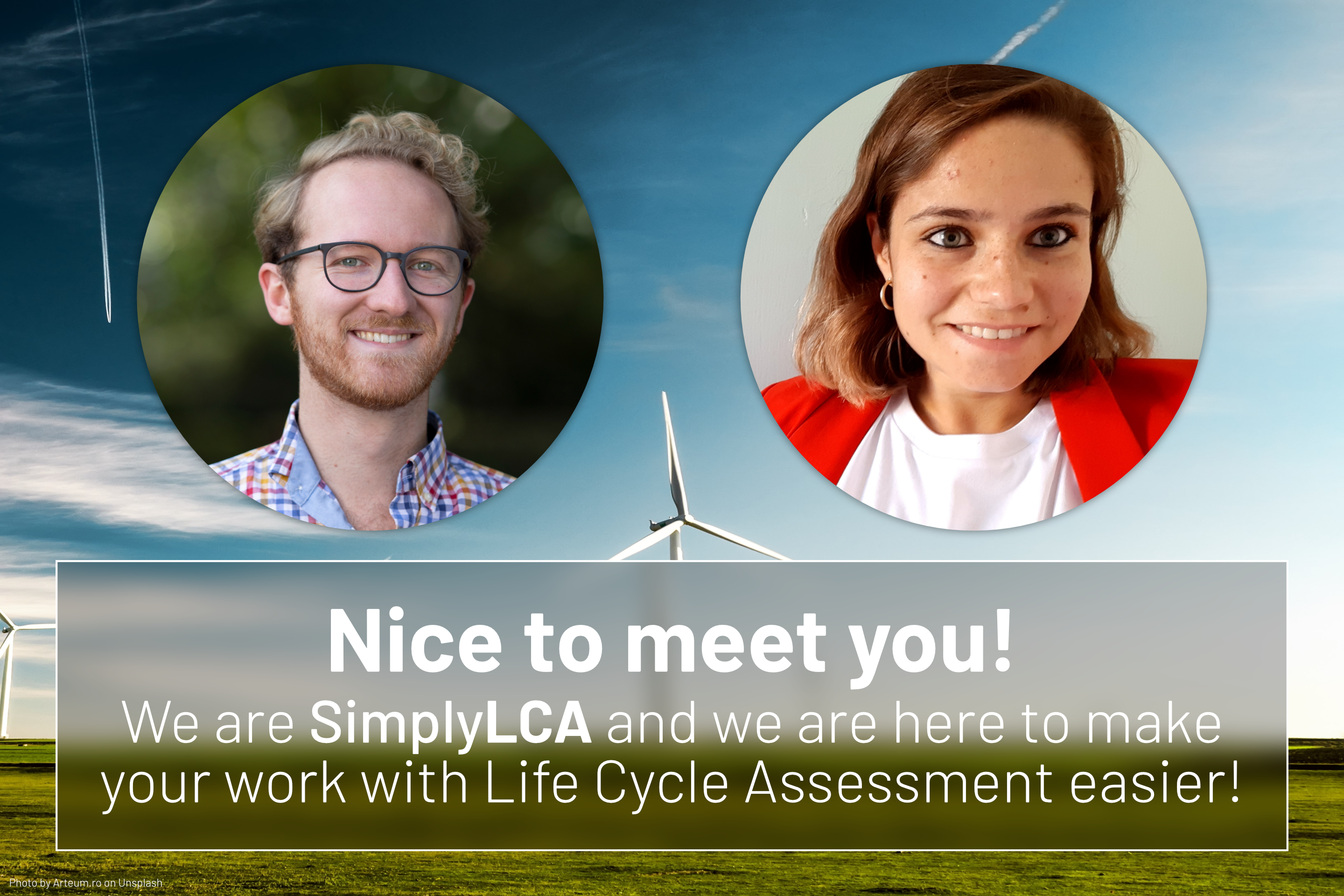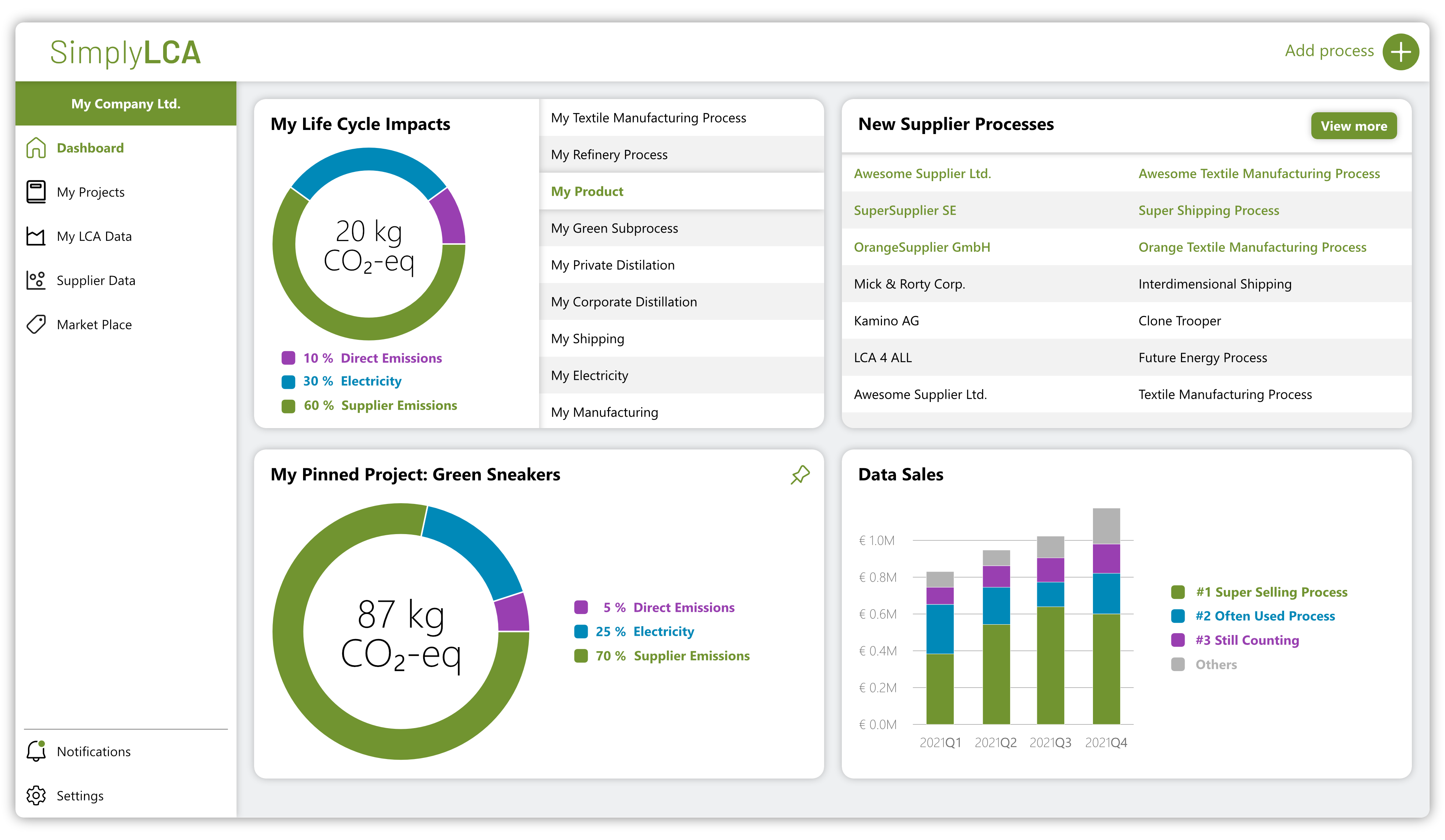SimplyLCA
PUBLIC
Germany, Technical University Munich, RWTH Aachen
Project Overview
Calculating a standardised environmental impact is done through Life Cycle Assessment (LCA), and can be performed for any process, service, or company, and it is used to build a world that is more environmentally friendly, less toxic, less harmful. We could say that LCA is at the core of a transition towards a sustainable society, it is one of the backbones of the Circular Economy model.
Users, researchers and practitioners in LCA spend hundreds of millions of dollars for LCA databases which so far contain only market-average secondary data. However, the gold standard in LCA is supplier-specific primary data, since it allows to assess the real supply chain of a product. Using primary data results in more accurate results and enables the sustainable optimisation of supply chains. By enabling the direct exchange of LCA data, we increase sellers’ profits by cutting database aggregators like Ecoinvent out of the process while giving data sellers access to a bigger customer base. We employ a freemium model by taking a share of seller’s revenue on our platform. However, access to and distribution of open-source data shall be for free to increase traffic and support adoption of LCA worldwide.
Our research and qualitative analysis has shown that LCA is a tedious, complex, and expensive process. Also, there is a struggle to fetch LCA data about the evaluated processes, used materials and third-party components as suppliers are reluctant to provide it due to the lack of expertise, resources, or interest. Consequently, a lot of smaller and medium size companies are left out of the game.
We currently build a global web platform for the publication, exchange, and trade of that data, enabling direct transfers between sellers and buyers of LCA data for the first time. Our cloud-native platform easily scales with the number of users, since we use an Azure-hosted PostgreSQL database in combination with a Python-based backend and a Vue.JS-based frontend which both run in Azure App Services. By using Zero-Knowledge-Proofs, we even enable the user to check the content of each dataset, before buying it. Additionally, through managing LCA data and dependencies on a project base, we enable leaner data management and plan to reduce the time spent on data gathering in the future by using Azure Machine Learning to provide AI-powered suggestions for model creation.
We have focused on both growing a community through our company’s LinkedIn page to create traction, and on the development of our product. We carried out user interviews with LCA practitioners to understand the pain-points of LCA practitioners and what the entire process is missing. Our findings helped us shape our website into a Minimum Viable Product (MVP) where we could perform quantitative studies through split testing to know what people drawn to our website were most interested about and decide what features our next MVP should have. Through our current MVP, we already allow customers to sign up for our waiting list, using the already incoming registrations as metric for the evaluation of our tests done with the MVP. This enabled us to test different sets of features without even building them and led us to the conclusion that there is a high interest in offering and buying LCA data.
Our mission is to allow for companies of any size to be involved in calculating the environmental impact for their products or their whole company, while making the processes more transparent and increasing the availability of the much-required data.
We envision our platform to grow viral, helping more and more businesses in assessing their environmental impact and that of their services and products each year. Therefore, creating value for them that translates into sustainable profit for all. In 5 years' time, we will have accelerated the rate of doing LCA and will have become the largest platform for the exchange of LCA data. Pioneering Artificial Intelligence to assist in the process of LCA, e.g. by automatising model generation, we further develop web-based tools and software for LCA, growing into a full-stack platform.
About Team
Until 2019, Lars studied Mechanical Engineering and Energy Technology at RWTH Aachen University and moved to Berlin in 2020 to continue his studies in Computer Science. While going to a lot of networking events, restaurants, and bars did not really work that well in 2020, he still managed to get to know some amazing people in young startups who, like him, wanted to make the world a better, more sustainable and fairer place for everyone. For him, improving the well-being of the people closest to him and the well-being of humanity was always important. That’s why he got into politics before he even thought of studying engineering and renewable energies in the first place.
Lars has a vision: A world without climate change, mass extinction, hunger, inequality, and poverty. But also a world with hope for the future, curiosity, meaning and the will to shoot for the stars.
Sabrina worked, studied and lived in Munich for the last eight years. Her background is quite uncommon since she has studied both Communication Sciences (LMU) and Information Systems (TUM). That gives her knowledge in user research, sociology and marketing, as well as software engineering, project management and agile development. She was shaped by her voluntary work in a youth organisation for young journalists where she had to take responsibility at a young age. Also, her being part of the female leadership program “femtec”, showed her why she wants to be a leader and what leading herself and others really means to her. She has previous working experience in start-ups and middle-sized companies, being in contact with larger corporations during her work as well. Her work included software engineering, product and project management, as well as managing an international team of about ten developers as a Scrum Master.
Sabrina’s passions are sustainability, technology and female leadership as well as diversity as a whole. She believes that sustainability without accessibility and diversity means nothing, and that IT is a way of reaching it all. Using digitalisation as a driver towards a more democratic society, more participation, better access to information and therefore more knowledge in how to start a journey towards sustainability.
In 2019, Lars met Julia, our mentor in the Imagine Cup, at the Student Energy Summit, where they won the Innovation Jam with their idea in the field of energy transition. Julia supports us with her valuable insights in Life Cycle Assessment (LCA) and Circular Economy, as well as her ongoing feedback, pushing us to do better. She comes from Spain but went to uni in England, and is now living in Berlin. She studied General Engineering specialising in New and Renewable Energies at Durham University. Back then, she attended many events for young people passionate about sustainable energy, which fed her enthusiasm and interest on the topic.
Another highly valued mentor of the team is Hendrik Winckler, who worked as a consultant, has studied business administration and trains us in all business-related topics. He now is a PhD student at RWTH Aachen and coaches our team from Go-to-Market Strategy, to Business Model, always with a critical view and high standards.
We are currently discussing partnerships with LCA researchers at RWTH Aachen University and the University of Haripur. Furthermore, we agreed on initial talks with the Berlin-based start-up PLAN3T and LCA practitioners we interviewed to utilise our platform. We are also in regular exchange with Carbon Minds, a provider of supplier-specific data in the chemical industry. We want to approach companies who already do Life Cycle Assessments to offer our platform. We intend to get into start-up programs to extend our network of partners and to find investors to fund our venture.
Around November 2020, Sabrina moved to Berlin and both committed to full-time work on the project. We are a team of equals splitting tasks based on skills and requirements. We focus a lot on growing as a team to be most valuable to our company. What unites us in our project, is the goal of more sustainability and diversity in the world, of fighting climate change and creating a company that serves a purpose. Since we have heard too often that sustainability and profitability were contradicting, to achieve both summarises the goal of our start-up perfectly. As we are a diverse team, we believe that it is a driver for innovation and as we grow, we plan to increase our diversity. We strongly believe that diverse teams are the ones who create better results.
Technologies we are looking to use in our projects
Javascript
Python
App Services (Mobile & Web
Azure
Storage


